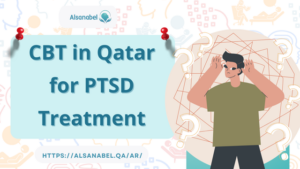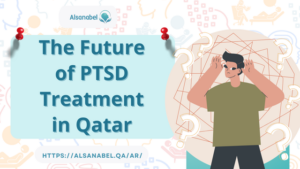Overcoming PTSD with Cognitive Behavioral Therapy Qatar 2024
- Category CBT in Qatar
Cognitive Behavioral Therapy Qatar has emerged as a highly effective treatment for overcoming PTSD. This therapeutic approach helps individuals reframe their thoughts, manage symptoms, and regain control over their lives. In this article, we will explore how CBT is utilized in Qatar to treat PTSD, highlighting its benefits, the process involved, and the positive outcomes experienced by those who undergo this form of therapy.
CBT in Qatar for PTSD Treatment
Cognitive Behavioral Therapy Qatar is a well-established and effective treatment approach for Post-Traumatic Stress Disorder (PTSD). Here’s how CBT is utilized in treating PTSD:

- PTSD Symptoms: PTSD can develop after experiencing or witnessing a traumatic event. Symptoms include intrusive memories, nightmares, flashbacks, avoidance of triggers, negative changes in mood and cognition, and heightened arousal (e.g., hypervigilance).
- CBT Approach: CBT for PTSD typically integrates several techniques aimed at addressing the cognitive and behavioral aspects of the disorder. The treatment is structured, time-limited, and focuses on specific goals agreed upon by the therapist and client.
Components of Cognitive Behavioral Therapy Qatar for PTSD:
a. Cognitive Restructuring:
- Clients learn to identify and challenge distorted thoughts related to the trauma. These thoughts often include feelings of guilt, shame, or exaggerated beliefs about danger.
- Therapists help clients reinterpret the traumatic event and its aftermath in a more balanced and realistic manner. This process reduces the emotional intensity associated with traumatic memories.
b. Exposure Therapy:
- Clients repeatedly recount the traumatic event in detail, imagining themselves back in the situation. This exposure helps process the memories and reduce their emotional impact over time.
- Clients gradually confront real-life situations or triggers that they have been avoiding due to trauma-related fear. Exposure is conducted in a safe and controlled manner to desensitize the client to these triggers.
c. Behavioral Techniques:
- Encouraging clients to engage in positive activities and routines that promote a sense of mastery and pleasure, counteracting the withdrawal and isolation common in PTSD.
- Teaching coping skills such as relaxation techniques, problem-solving strategies, and stress management to help clients manage PTSD symptoms more effectively in daily life.
d. Education and Psychoeducation:
- Providing information about PTSD symptoms, common reactions to trauma, and the rationale behind CBT techniques helps normalize experiences and fosters empowerment in clients.
- Educating clients about potential triggers and teaching strategies to maintain gains achieved in therapy and prevent relapse after treatment concludes.
Effectiveness of Cognitive Behavioral Therapy Qatar for PTSD:
- Evidence-Based Approach: CBT for PTSD has substantial empirical support, demonstrating significant reductions in PTSD symptoms and improvements in overall functioning.
- Long-Term Benefits: Research indicates that gains from CBT can be sustained over time, with many individuals experiencing lasting symptom relief and improved quality of life post-treatment.
Integration with Other Treatments:
- Adjunctive Therapies: CBT may be combined with other approaches such as medication (e.g., selective serotonin reuptake inhibitors) or mindfulness-based techniques to enhance treatment outcomes.
- Comprehensive Care: Collaborative care models involving psychiatrists, psychologists, and other healthcare providers ensure holistic treatment addressing both mental health and any associated medical or psychosocial needs.
CBT for PTSD treatment in Qatar is a structured and effective treatment approach that addresses the cognitive, emotional, and behavioral aspects of trauma. By helping individuals process traumatic memories, challenge maladaptive beliefs, and develop coping skills, CBT empowers clients to regain control over their lives and achieve meaningful recovery from PTSD. Its evidence-based nature and adaptability make it a cornerstone in trauma-focused therapy, offering hope and healing to those affected by PTSD.
Availability and Accessibility of CBT in Qatar
In Qatar, Cognitive Behavioral Therapy (CBT) is available through various healthcare providers, including mental hospital in Qatar, clinics, and private practices. Here’s an overview of the availability and accessibility of CBT in Qatar:
- Hospitals and Medical Centers: Major hospitals in Qatar, such as Hamad Medical Corporation (HMC) and private hospitals like Sidra Medicine and Al Ahli Hospital, offer mental health services that may include CBT. These facilities have multidisciplinary teams that may include psychiatrists, psychologists, and therapists trained in CBT.
- Private Clinics and Practices: There are several private clinics and practices across Doha and other cities in Qatar that specialize in mental health services, including CBT. These clinics may offer a range of therapeutic approaches tailored to individual needs.
- Psychiatric and Psychological Services: Psychiatrists and psychologists in Qatar are trained in various therapeutic modalities, including CBT. They provide comprehensive assessments, diagnosis, and treatment plans that may incorporate CBT techniques to address a variety of mental health conditions.
- Community Health Centers: Community health centers and primary care facilities in Qatar may also provide access to basic mental health services, including initial assessments and referrals to specialized CBT providers if needed.
- Accessibility: The accessibility of CBT services in Qatar may vary based on factors such as location, language preferences, and insurance coverage. It’s advisable to inquire about CBT availability and accessibility when scheduling appointments or seeking referrals from healthcare providers.
- Cultural Considerations: Qatar’s healthcare system acknowledges cultural diversity, and efforts are made to provide culturally sensitive care. CBT providers in Qatar are trained to respect cultural beliefs and values, ensuring that therapy is tailored to meet the needs of diverse populations.
- Telehealth Options: With advancements in technology, some healthcare providers in Qatar may offer telehealth or online CBT sessions, which can improve accessibility for individuals living in remote areas or those with mobility issues.
For individuals seeking CBT in Qatar, it’s recommended to consult with a healthcare provider or psychiatrist in Qatar to discuss treatment options, assess availability, and determine the most suitable approach for addressing specific mental health concerns.
The Future of PTSD Treatment in Qatar
The future of PTSD treatment in Qatar is evolving, with several factors shaping its trajectory:

- Awareness and Recognition: There is a growing awareness and recognition of PTSD as a significant mental health issue in Qatar. This awareness helps reduce stigma and encourages individuals to seek timely treatment.
- Specialized Services: There is an increasing focus on developing specialized services for PTSD within Qatar’s healthcare system. This includes dedicated PTSD clinics, specialized treatment programs, and trained professionals who can provide evidence-based therapies.
- Evidence-Based Therapies: The future of PTSD treatment in Qatar will likely emphasize evidence-based therapies, such as Cognitive Behavioral Therapy (CBT), Eye Movement Desensitization and Reprocessing (EMDR), and trauma-focused therapies. These therapies have shown effectiveness in reducing PTSD symptoms and improving quality of life.
- Integration of Technology: Telehealth and digital platforms are being integrated into PTSD treatment services, allowing for remote consultations, therapy sessions, and access to educational resources. This enhances accessibility, particularly for individuals in remote areas or those with mobility challenges.
- Collaborative Care Approaches: Collaborative care models involving psychiatrists, psychologists, social workers, and other healthcare professionals are likely to be enhanced. These models ensure comprehensive assessment, personalized treatment planning, and ongoing support for individuals with PTSD.
- Research and Innovation: Continued research into PTSD treatment outcomes, cultural adaptations of therapies, and innovative approaches will drive advancements in care. Research studies contribute to improving treatment protocols and addressing the unique needs of Qatar’s diverse population.
- Community Support and Education: Community support groups, educational programs, and advocacy initiatives will play a crucial role in supporting individuals with PTSD and their families. These efforts promote awareness, provide resources, and foster a supportive environment for those affected by PTSD.
- Cultural Sensitivity: Recognizing and addressing cultural factors that influence PTSD treatment and recovery will be integral. Cultural sensitivity ensures that treatment approaches respect cultural beliefs, values, and practices, thereby enhancing engagement and treatment outcomes.
- Emergency and Crisis Services: Enhanced access to emergency and crisis services for individuals experiencing acute PTSD symptoms or mental health crises will be prioritized. Quick interventions and appropriate support systems can prevent escalation and promote recovery.
In conclusion, overcoming PTSD with Cognitive Behavioral Therapy Qatar offers a promising path to healing and recovery. By addressing negative thought patterns and behaviors, CBT helps individuals regain control over their lives and reduces the debilitating symptoms of PTSD. With the support of skilled therapists and a structured therapeutic approach, patients in Qatar can find effective relief and build resilience. Embracing this evidence-based treatment not only improves mental health but also enhances overall quality of life, paving the way for a brighter, more hopeful future.









